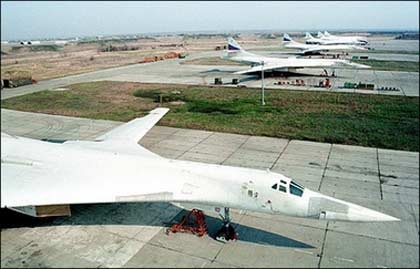Russia capable of hitting US missile shield
(AFP)Updated: 2007-03-06 08:43
Russia's bomber force would have no trouble destroying planned US missile defense sites in Europe, its head said Monday as the country's security council warned of new policies to counter NATO.
"Since the components of the anti-missile defence system are weakly protected, all types of our aircraft are capable of using electronic countermeasures against them and physically destroying them," Interfax news agency quoted Lieutenant General Igor Khvorov as saying.
The Kremlin has fiercely protested US plans to install an anti-missile system in Poland and the Czech Republic. Washington insists it would not be aimed at Russia but designed to counter attacks from countries such as Iran and North Korea.
Khvorov also said Russia is modernizing its fleet of Tu-160 strategic bombers, with two updated versions of the aircraft expected to be ready this year.
Known as Blackjack to the North Atlantic Treaty Organisation, the Tu-160 is a highly manoeuvrable supersonic strategic bomber.
Meanwhile the national security council said Russia is to adopt a new military doctrine in response to the "strengthening" of NATO forces, in the latest sign of worsening relations between the two sides.
"The analysis of the international situation shows that recourse to military force is increasingly the policy of leading world states," the council said in an announcement that the new doctrine was in preparation.
"The military policy of the principal countries devotes more and more energy to the modernisation of the armed forces," including updating their weapons technology and strategies, it said.
"Military alliances are strengthening, and especially NATO," the Russian security council claimed.
"Armed forces are being used above all as a principal instrument for pursuing the economic and political interests of countries" in the West, it said.
The council statement echoed hard-hitting speeches by Russian President Vladimir Putin last month.
In Moscow on February 22 Putin warned, "We are encountering a dangerous disdain for international law, ambitions to use military force to achieve personal interests," in what appeared to be a veiled reference to the United States.
His comments came less than two weeks after he made a full-frontal assault on US foreign policy in a speech in Munich, saying the United States had "overstepped its borders in all spheres."
|
||
|
||
|
|

